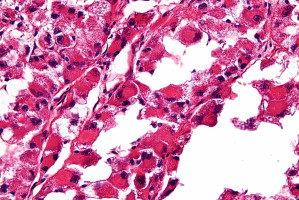
Findings from a randomised phase III trial point to a promising new therapy for patients with advanced intermediate or high grade liposarcoma or leiomyosarcoma whose disease worsened after two or more lines of initial therapies.
Patients treated with the chemotherapy drug eribulin had a two-month increase in median overall survival compared to those treated with the standard drug dacarbazine.
According to the authors, this is the first randomised phase III study to show an improvement in overall survival in patients with this aggressive family of diseases.
“Soft-tissue sarcomas are relatively rare and can be very difficult to treat. The efficacy of available drugs for initial therapy is very unsatisfactory, and patients whose disease progresses despite two or more lines of treatment have a very poor prognosis,” said lead study author Patrick Schöffski, MD, MPH, Head of Department of General Medical Oncology, University Hospitals Leuven in Leuven, Belgium.
“For a disease where such few treatment options exist, a two- month improvement in survival is significant. The more treatments our patients have access to, the better their chances of improving life expectancy.”
An estimated 12,000 people will be diagnosed with soft-tissue sarcoma in the United States this year.
Soft-tissue sarcoma is a diverse family of rare diseases, and liposarcomas and leiomyosarcomas are among the more common types.
Patients with advanced, metastatic soft-tissue sarcoma have poor outcomes, typically with survival of one year or less.
There are currently few treatment options available, particularly at the point the disease worsens or further spreads to other parts of the body despite prior therapy.
In the study, 452 patients with advanced leiomyosarcoma or adipocytic sarcoma, which is also called liposarcoma, were randomly assigned to treatment with eribulin or dacarbazine until disease progression.
Leiomyosarcoma (which starts in smooth muscle) and adipocytic sarcoma (which starts in fat tissue) are difficult-to-treat malignancies.
All patients had cancers that had worsened upon receiving two or more prior treatments.
The median overall survival was 13.5 months in the eribulin group and 11.5 months in the dacarbazine group.
The most common side effects associated with eribulin were low white blood cell counts, fatigue, nausea, hair loss, and constipation, and 8% of patients stopped treatment due to side effects.
Low platelet counts were more common in the dacarbazine group compared to the eribulin group.
Grade 3 and 4 treatment-related side effects occurred more frequently with eribulin than dacarbazine.
Eribulin belongs to a class of anticancer drugs known as microtubule inhibitors, which block cell division.
It was originally derived from a natural source ─ a sea sponge.
The FDA approved eribulin for the treatment of advanced breast cancer in 2010.
Several additional analyses are ongoing, including quality of life analysis, subgroup analysis and biomarker tests.
The results of those analyses will be reported at a later date.
Watch the press conference for more
Source: ASCO